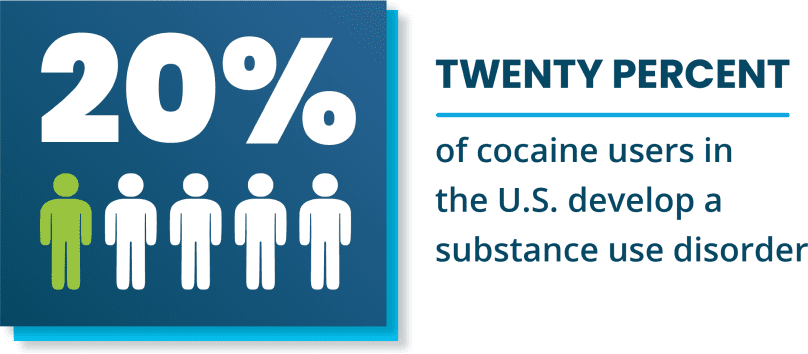Cocaine and Teens: A Lethal Combination
The pervasive issue of teenage substance abuse continues to be a pressing concern in our society. Among the myriad illicit drugs, cocaine is a dangerous and alluring choice for adolescents. This lethal combination of vulnerable youth and a potent stimulant has far-reaching consequences on individual lives, families, and communities.
Understanding the dangers of crack and cocaine addiction is crucial for developing effective preventive measures and providing much-needed support to the young lives at risk.
Key Takeaways
Remember, cocaine dependence is treatable; professional help can build healthier and happier lives. Here’s what you need to know about teenage cocaine addiction:
- Cocaine is a powerfully addictive stimulant drug that can have devastating consequences on the lives of teenagers, leading to physical, mental, and social health issues.
- Experimenting with cocaine can quickly spiral into addiction, negatively impacting education, relationships, and overall well-being.
- Prevention and education efforts should prioritize providing teenagers with healthy coping mechanisms to resist peer pressure and make informed choices.
Call us at (845) 539-0834 for more information about our residential rehabilitation for teens.

What is Cocaine?
Cocaine is a highly addictive and potent stimulant drug derived from the leaves of the coca plant native to South America. It is processed into a fine, white powder that can be ingested through various means, including snorting, smoking, or injecting. Cocaine acts on the central nervous system, producing intense euphoria, increased energy, and heightened alertness.
However, these stimulant effects are short-lived and often followed by a crash, leading to a dangerous cycle of use and potential addiction.
Cocaine addiction among teenagers is increasing day by day. According to research, around 4.8 percent of high school students in the United States reported using cocaine at least once in their lifetime.
Recognizing Signs of Cocaine Abuse in Teens
Recognizing signs of cocaine use in teens can be challenging, as some indicators may overlap with typical adolescent behavior. However, if you suspect your teenager may be using cocaine, open a discussion with your child and look for physical, behavioral, and psychological signs.
Here are some common signs to watch out for:
Physical Symptoms
- Dilated pupils
- Nosebleeds
- Weight loss
- Restlessness
- Track marks (if injected)
- Sleep changes
Behavioral Symptoms
- Secrecy and withdrawal
- Unexplained absences
- Stealing for money
- Social circle changes
- Financial problems
- Performance decline
Psychological Symptoms
- Anxiety and paranoia
- Euphoria and mood swings
- Concentration difficulties
- Risky behavior
- Hallucinations (severe cases)
- Denial of the issue
Root Causes of Cocaine Use in Teenagers
Various factors can influence teenage cocaine use, and it’s important to note that each individual’s reasons may vary.
Here are some common factors that contribute to teenage cocaine use:
Peer Pressure: Adolescents are often susceptible to peer pressure, and some may try crack cocaine because their friends or acquaintances are using it. They may feel pressured to fit in or be part of a social group that uses drugs. Teens are particularly vulnerable to peer pressure because they are in a phase of social development that focuses on building friendships and forming identities.
Genetics and Family History: A family history of drug abuse or addiction can lead to an increased risk of a teenager trying cocaine, as there may be a genetic predisposition to addiction. Having a parent with an addiction does not mean you will have an addiction yourself, but statistics show it does increase the chances of addiction. This may be due to genetics (nature) or socialization (nurture).
Accessibility: Depending on their environment, some teenagers may find it relatively easy to access drugs like cocaine, alcohol, fentanyl, and heroin through friends, older acquaintances, or family members. The more access you have to a substance, the more likely you are to try and become addicted to the substance.
Emotional and Mental Health Issues: Teenagers struggling with emotional or mental health problems, such as depression or anxiety, may use drugs like cocaine to self-medicate and alleviate their symptoms. Cocaine is particularly attractive to busy students who believe that cocaine can help them finish their schoolwork. This application ignores the consequences of cocaine use, which hinders academic achievement in the long run.

Influences Behind Teenage Cocaine Use
Understanding the risk factors behind cocaine use in teens can help develop prevention and intervention strategies.
Here are some influences behind teenage cocaine use:
Teenagers are naturally curious about the world around them, which can lead them to experiment with drugs like cocaine to experience euphoric effects.
Adolescence can be challenging, with academic pressures, family issues, and emotional ups and downs. Some teenagers may use cocaine to cope with stress or temporarily escape their problems.
The glorification of drug use in movies, music, and other forms of media can normalize drug experimentation in the eyes of teenagers.
Some teenagers are naturally more inclined to engage in risky or sensation-seeking behaviors, which can make them more likely to experiment with drugs.
Insufficient education about the risks and consequences of drug use may lead some teenagers to underestimate the dangers associated with cocaine.

Effects of Cocaine Addiction on Teenagers
Cocaine overdose among teenagers can have a range of serious adverse effects on their physical, mental, and social well-being. The powder form of cocaine is a highly addictive, illegal drug, and its use among adolescents can lead to numerous negative consequences.
Here are some of the potential effects of cocaine among teenagers:
Physical Health Effects: Cocaine use among teenagers can have severe physical effects. The drug’s stimulant properties can increase heart rate and blood pressure, potentially resulting in heart palpitations, chest pain, and a higher risk of panic attack and stroke. Respiratory problems, such as difficulty breathing, chronic cough, and lung damage, are also associated with high doses of cocaine.
Moreover, cocaine’s appetite-suppressing effects can lead to unhealthy weight loss and malnutrition, impacting overall physical well-being. Additionally, snorting cocaine can damage the nasal passages, causing chronic nosebleeds and a loss of smell.
Mental Health Effects: Adolescents who use cocaine are at risk of experiencing significant mental health problems. Strong cravings for the drug can induce mood swings, with intense euphoria followed by periods of depression and anxiety.
Furthermore, chronic use of cocaine is linked to mental health disorders, including anxiety, paranoia, and hallucinations, which can profoundly affect a teenager’s emotional and psychological well-being.
Higher doses of cocaine can impair decision-making abilities, resulting in risky behaviors and poor judgment. Additionally, chronic cocaine use may affect memory and learning abilities, hindering academic performance and long-term educational prospects.
Social and Behavioral Consequences: The social and behavioral consequences of teenage cocaine use can be profound. Relationships with family and friends may deteriorate due to changes in behavior, mood swings, and potential financial problems associated with drug use.
Legal issues are also a concern, as the possession and use of cocaine are illegal activities that can lead to legal consequences if discovered. Academic and occupational problems are common among teenagers using cocaine, as their focus may shift away from their studies or future career prospects.

Breaking The Cycle: Treating Cocaine Addiction in Teens
Treating cocaine addiction in teenagers requires a comprehensive approach that addresses both the physical and psychological aspects of addiction. The treatment options you mentioned are all valuable components of a teenager’s recovery plan.
Also known as inpatient treatment, this involves a teenager living in a treatment facility for a specified period. These programs provide a structured, drug-free environment where teens receive intensive therapy, counseling, and support.
Residential treatment is particularly useful for those with severe addiction or co-occurring mental health disorders.
Both individual and group therapy play essential roles in addiction treatment. Individual therapy allows young people to work one-on-one with a therapist to address underlying issues, develop coping strategies, and set goals for recovery. Group therapy provides a supportive environment to share experiences and learn from peers facing similar challenges.
Support groups, such as Narcotics Anonymous (NA) or Cocaine Anonymous (CA), can benefit teenagers in recovery from drug abuse. These groups provide a sense of community and offer a platform for sharing experiences, receiving support, and learning from others who have overcome addiction.
How to Protect Your Child from Cocaine Addiction
Protecting your child from cocaine abuse requires open communication, education, and creating a supportive and safe environment.
Here are some guidelines for parents:
- Maintain open communication with your child to discuss drug dangers.
- Educate them about cocaine risks from an early age.
- Be a drug-free role model and lead by example.
- Set clear boundaries and monitor their activities.
- Nurture self-esteem and resilience through positive activities.
- Monitor online interactions and educate about online drug dangers.
- Teach them how to handle peer pressure confidently.
- Get to know your child’s friends and their parents.
- Watch for warning signs of drug use.
- Seek professional help from a healthcare provider if you suspect drug issues.
- Engage with drug prevention initiatives in your community.
- Spend quality family time to strengthen bonds.
Get Help
If you’re suffering from cocaine addiction, getting help as early as possible is essential. Cocaine addiction is a severe illness that can lead to many problems. Getting help as early as possible can significantly improve your chances of recovery. Call us to get started with treatment.
Our resources are available to help you overcome your addiction with evidence-based therapies and innovative treatments proven by medical science to effectively manage your addiction. Our admissions counselors can help you learn more about the disease and how to keep it out of your life. Contact us confidentially today.

Frequently Asked Questions (FAQ)
What is crack cocaine?
Crack cocaine is a potent and highly addictive drug. It is derived from cocaine and appears as small, rock-like crystals that can be smoked. The name “crack” refers to the cracking sound it makes when heated.
It produces intense, short-lived euphoria and energy but often leads to dangerous health risks and addiction due to its rapid onset and dangerous side effects.
How was cocaine discovered?
Cocaine was first discovered by indigenous South American populations, such as the Inca civilization, who chewed coca leaves for their stimulating effects. Spanish explorers encountered this practice in the 16th century.
However, it wasn’t until the mid-19th century that cocaine was isolated in pure form by a German chemist named Albert Niemann. It gained popularity in the medical and recreational fields before being classified as a controlled substance due to its addictive and harmful properties.
What are the effects of cocaine use?
Cocaine use leads to intense but short-lived euphoria, increased energy, and heightened alertness. Users may experience decreased appetite, violent behavior, high blood pressure, increased heart rate, respiratory failure, and dilated pupils. Regular use of cocaine can lead to anxiety, paranoia, hallucinations, and cardiovascular problems.
Research claims that large amounts of cocaine use can result in addiction, cognitive impairments, damage to the nose (from snorting), or other health issues when consumed in various forms. Cocaine use can have severe social, legal, and physical consequences.
Trust the Science: Find Healing Today!
Is your child trapped in the devastating cycle of cocaine addiction? It’s time to take action and return them to a life filled with hope, health, and happiness.
We specialize in a holistic healing approach that combines various therapeutic modalities, including individual counseling, group therapy, family therapy, enlightening educational workshops, and rejuvenating recreational activities to assist teenagers in breaking free from cocaine dependence.
In addition, our medical professionals empower young adults to develop healthy coping mechanisms and build a rock-solid foundation for a brighter future. Don’t let addiction steal your child’s future. Call (845) 539-0834 today and embark on lasting recovery.

